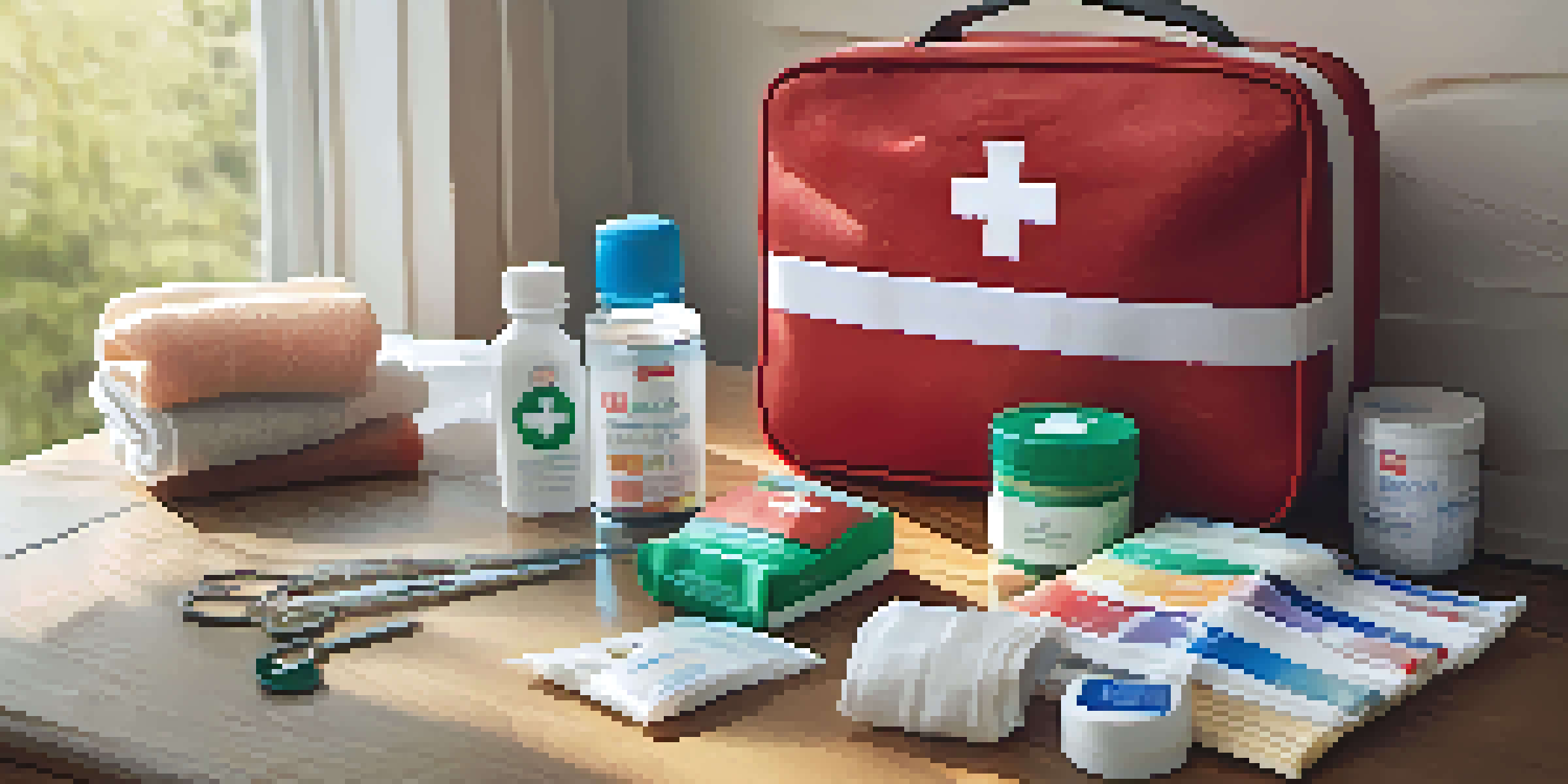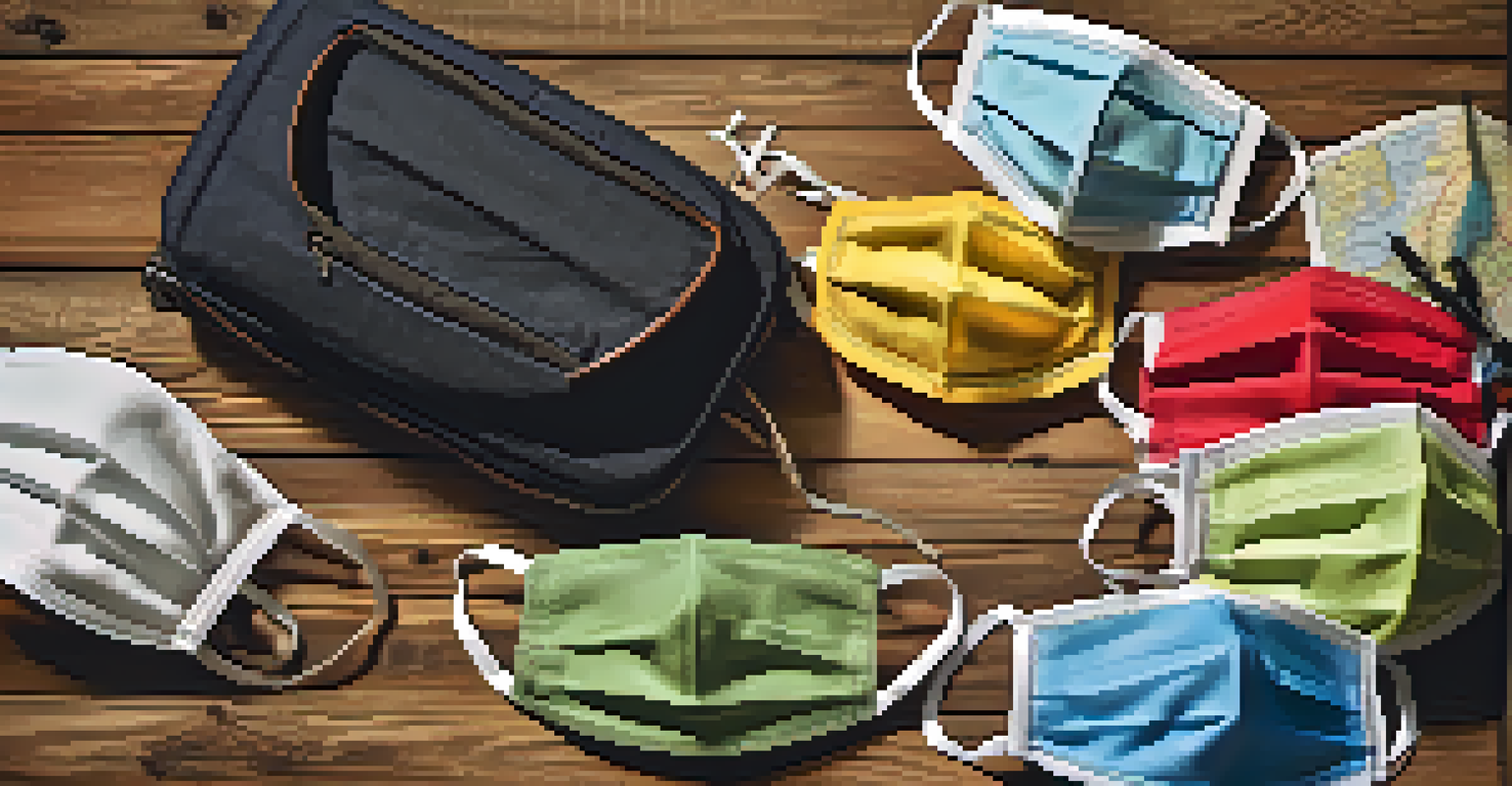Packing Essentials: Health and Safety Items for Travelers

First Aid Kit: Your Travel Safety Net
A well-stocked first aid kit is a travel essential that can make a world of difference. Whether it's a scraped knee from an adventurous hike or a headache after a long flight, having basic medical supplies on hand can provide peace of mind. Look for kits that include adhesive bandages, antiseptic wipes, gauze, and pain relievers.
An ounce of prevention is worth a pound of cure.
You can either buy a pre-made kit or create your own tailored to your needs. Don't forget to add any personal medications, allergy treatments, or specific items that cater to your health requirements. Remember, it's always better to be prepared than to scramble for supplies in a foreign place.
When packing your first aid kit, consider the size and weight, especially if you're traveling light. Opt for compact versions that fit easily in your luggage but still offer a comprehensive range of supplies. A small, portable kit can be a lifesaver when you're on the go.
Hand Sanitizer: A Must for Hygiene on the Go
In today's world, hand sanitizer has become an essential item for travelers. It's a quick and effective way to keep your hands clean when soap and water are not readily available. Look for a hand sanitizer that contains at least 60% alcohol for optimal effectiveness.

Traveling often exposes you to various germs, especially in crowded places like airports and public transport. Regularly using hand sanitizer can help reduce your risk of getting sick. Plus, it's a great way to stay healthy while enjoying new experiences without worrying about your health.
Pack a Well-Stocked First Aid Kit
A comprehensive first aid kit provides essential supplies to handle minor injuries and health issues while traveling.
Consider carrying a travel-sized bottle of hand sanitizer attached to your bag or pocket for easy access. This small, lightweight item can make a big difference in maintaining your hygiene and confidence during your travels.
Face Masks: Protection for You and Others
Face masks have become a vital part of health and safety for travelers since the pandemic. They not only protect you from respiratory infections but also safeguard those around you. Pack a supply of reusable or disposable masks to ensure you are prepared for various situations.
By failing to prepare, you are preparing to fail.
In crowded destinations, wearing a mask can significantly reduce the spread of germs. It shows consideration for your fellow travelers and can be a requirement in certain places, such as public transport or indoor attractions. Being equipped with masks allows you to embrace your travel plans confidently.
Choose masks that are comfortable to wear for extended periods, and consider bringing a couple of different styles. This way, you can adapt to various settings while keeping your health and safety a top priority.
Insect Repellent: Keep Bugs at Bay
If you're heading to a destination known for its insects, packing insect repellent is a must. Bug bites can spoil your travel experience, especially in tropical climates where diseases like Zika or malaria are a concern. Look for a repellent that contains DEET or natural alternatives to keep those pesky bugs away.
Applying insect repellent regularly can help you enjoy outdoor activities without the fear of annoying bites or potential health risks. Always follow the application instructions to ensure maximum effectiveness. It's worth taking this simple precaution.
Don't Forget Personal Medications
Bringing your prescription medications and a copy of your prescriptions is crucial for avoiding complications during your trip.
Don't forget to pack repellent in a travel-sized bottle to save space in your luggage. A small amount can go a long way in protecting you from those pesky insects, allowing you to focus on exploring and enjoying your trip.
Travel Insurance: Safety Net for Unexpected Events
While it's not a physical item to pack, travel insurance is one of the most critical safety items for travelers. It can provide coverage for unexpected events like trip cancellations, lost luggage, or medical emergencies. Investing in travel insurance can give you peace of mind as you venture into the unknown.
When choosing a travel insurance policy, consider your specific needs and the activities you'll be engaging in during your trip. Some policies offer additional coverage for adventure sports or health emergencies, so review the options carefully. Being informed can help you make the right choice.
Having travel insurance means you're covered in case of emergencies, allowing you to enjoy your trip without constant worry. It's a small price to pay for the security it offers, making it an essential item on your packing list.
Personal Medications: Don't Leave Them Behind
If you take prescription medications or have specific health needs, packing your personal medications should be a top priority. Always keep them in their original containers and bring a copy of your prescriptions in case you need to refill them while traveling. This practice can save you from unnecessary complications.
It's wise to carry more medication than you think you'll need, especially if you're traveling to remote areas. Consider the possibility of delays or changes in your itinerary that could affect your access to pharmacies. Having extra supplies can eliminate stress during your trip.
Prepare Emergency Contact Information
Having a list of emergency contacts, including local services and your embassy, can be invaluable in challenging situations during your travels.
Additionally, organize your medications in a dedicated pouch or container to make it easy to find what you need. Keeping everything in one place allows for efficient access and ensures you won't accidentally forget any essential items.
Emergency Contacts: Know Who to Call
Before you embark on your travels, compiling a list of emergency contacts is a smart move. This list should include local emergency services, your country's embassy, and any personal contacts back home. Having this information readily available can be invaluable if you find yourself in a challenging situation.
Consider saving these contacts in your phone and printing a hard copy to keep in your wallet or travel documents. In the event of an emergency, being able to access this information quickly can make a significant difference in how you handle the situation. You’ll feel more prepared and secure.

Additionally, share your travel itinerary with someone you trust, so they know where you are. This simple step can provide added peace of mind, knowing that someone is aware of your whereabouts in case anything goes awry during your travels.